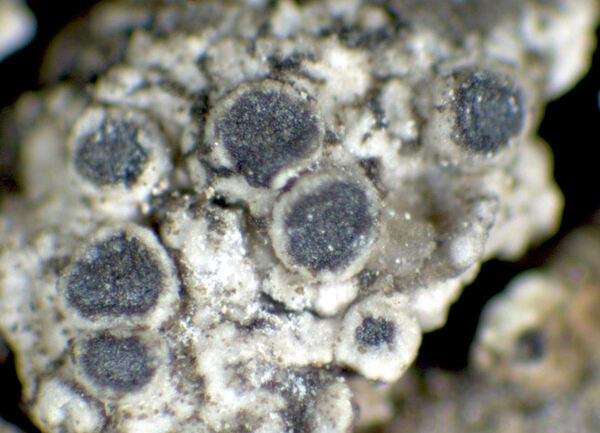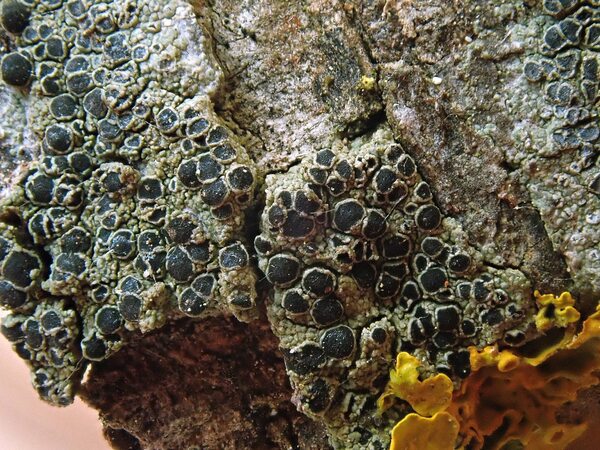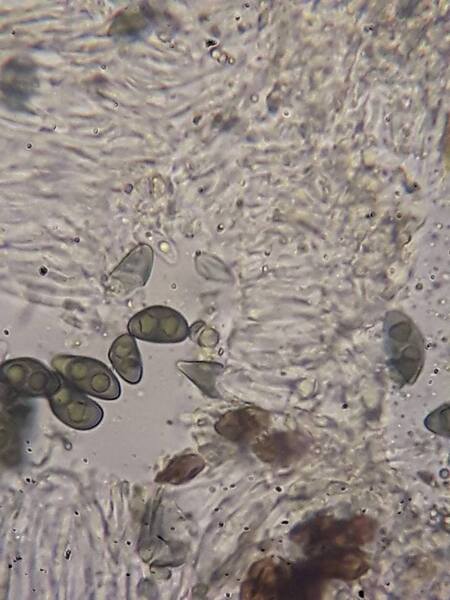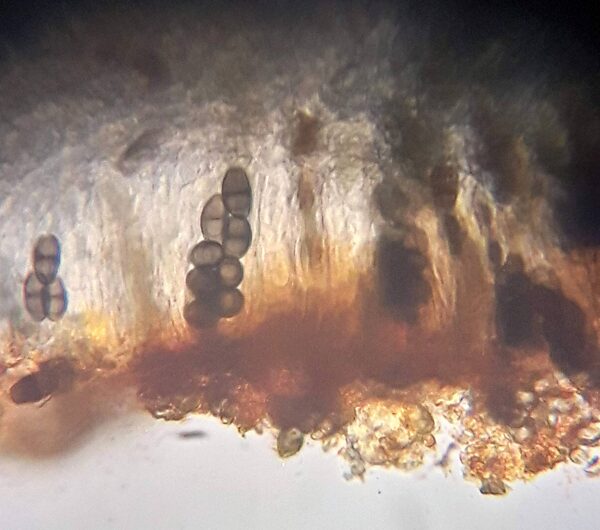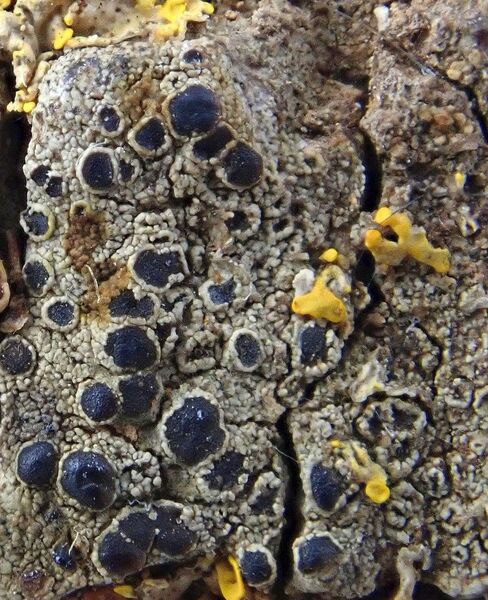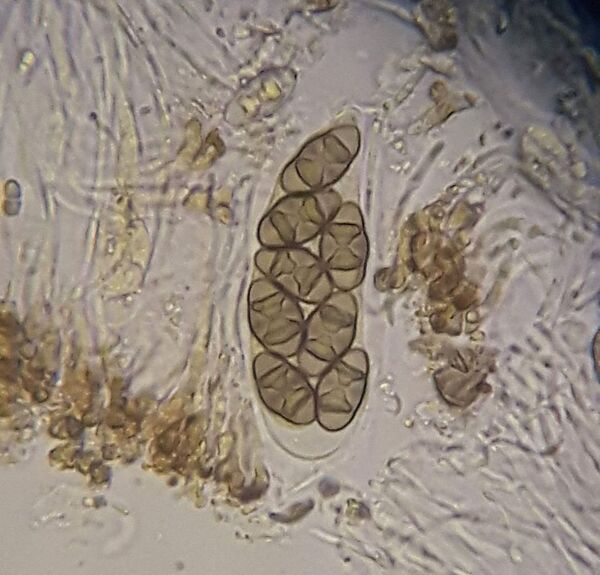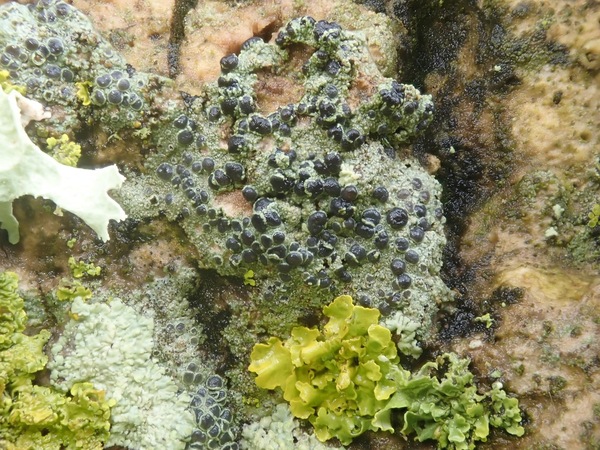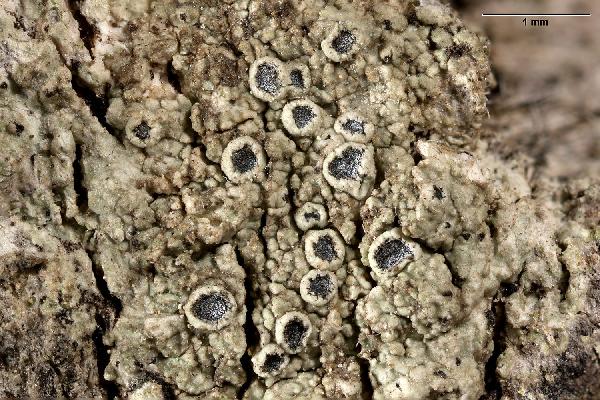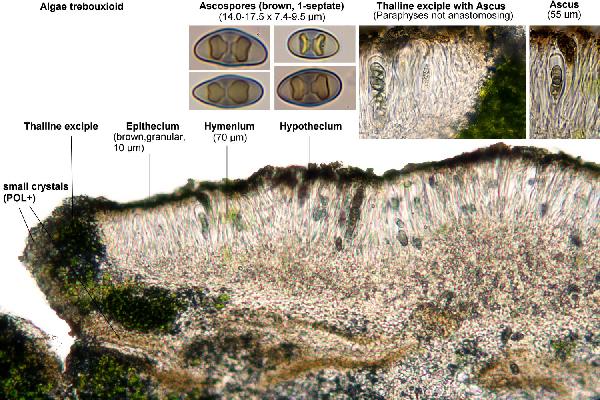Rinodina pruinella Bagl.
Nuovo Giorn. Bot. Ital., 11: 79, 1879.
Synonyms: Lecanora pruinella (Bagl.) Samp.; Lecanora pruinella var. cintrana Samp.; Rinodina cintrana Samp.; Rinodina magnussoniana Reichert & Galun; Rinodina maroccana H. Magn.; Rinodina pruinella f. laevigata H. Magn.; Rinodina turgescens H. Magn.
Distribution: C - Tosc (Putortì & Loppi 1999), Laz (Giralt & Mayrhofer 1994), Sar (Baglietto 1879: Giralt & Mayrhofer 1994, Zedda 2002). S - Pugl (Jatta 1909-1911), Si (Giralt & Mayrhofer 1994, Giralt & al. 1994, Nimis & al. 1996b).
Description: Thallus crustose, episubstratic, continuous, smooth to granulose, whitish, pale grey or greenish, with or without a distinct prothallus. Apothecia lecanorine, scattered to confluent, sessile, slightly constricted at base, (0.4-)0.6-0.8(-1) mm across, with a flat to convex, dark brown to black, at least initially white-pruinose disc, and a thick, at first entire, then crenulate to verrucose, prominent and persistent thalline margin; proper margin often visible as a parathecial ring between the disc and the thalline margin. Thalline exciple 50-100 μm thick, corticate; proper exciple 10-20 μm wide laterally, expanding slightly in upper part; epithecium dark brown, with a granular epipsamma reacting P+ orange; hymenium colourless, 70-100 μm high; paraphyses up to 2 μm thick at mid-level, the apical cells 2-5 μm wide; hypothecium pale yellowish brown. Asci 8-spored, clavate, the K/I+ blue tholus penetrated by a faintly amyloid apical cushion with parallel or diverging flanks, the wall K/I-, surrounded by a K/I+ blue outer layer, Lecanora-type. Ascospores 1-septate, brown, ellipsoid, (13-)16-20(-25) x (7-)8-10(-13) μm, Dirinaria-type, swollen around the septum after treatment with K, the wall strongly warted, with a poorly developed torus, the ontogeny of type B (apical thickenings visible before the insertion of the septum). Pycnidia rare, immersed. Conidia bacilliform, 3-5 x 1-1.5(-2) μm. Photobiont chlorococcoid. Spot tests: thallus K+ yellow, C-, KC-, P-. Chemistry: thallus with atranorin, epithecium with pannarin.Note: a Mediterranean-Atlantic species, mainly found on twigs of trees and shrubs near the sea; mainly Tyrrhenian in Italy.
Growth form: Crustose
Substrata: bark
Photobiont: green algae other than Trentepohlia
Reproductive strategy: mainly sexual
Taxon bound to maritime-coastal situations
Commonnes-rarity: (info)
Alpine belt: absent
Subalpine belt: absent
Oromediterranean belt: absent
Montane belt: absent
Submediterranean belt: absent
Padanian area: absent
Humid submediterranean belt: absent
Humid mediterranean belt: rather rare
Dry mediterranean belt: rare
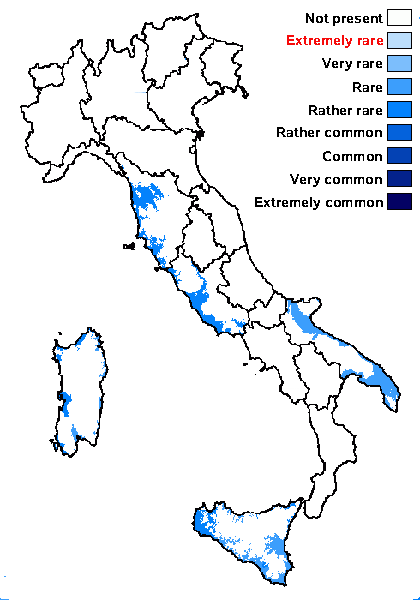
Predictive model
Herbarium samples
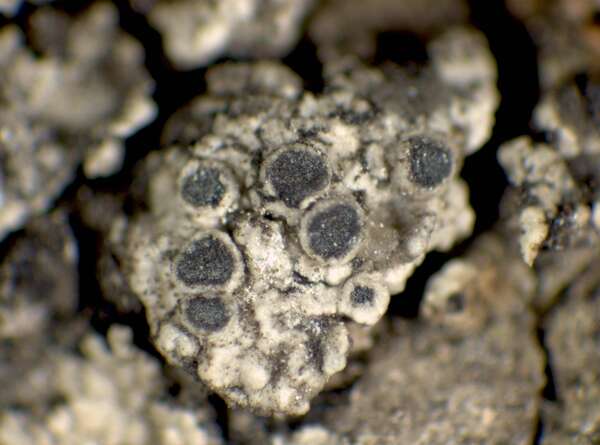

P.L. Nimis; Owner: Department of Life Sciences, University of Trieste
Herbarium: TSB (9973)
2001/12/11
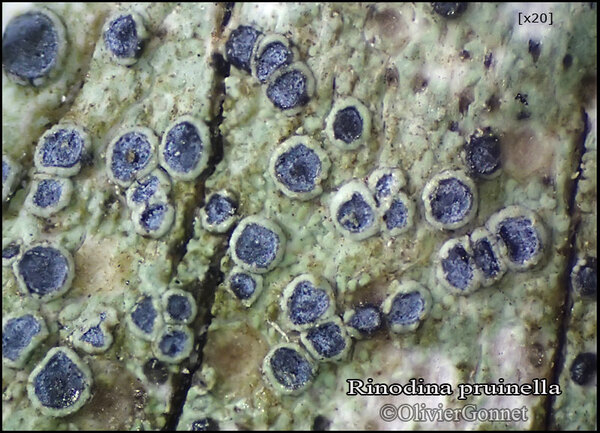
Courtesy Danièle et Olivier Gonnet - Source: https://www.afl-lichenologie.fr/Photos_AFL/Photos_AFL_R/Textes_R2/Rinodina_pruinella.htm
France, 28/3/2016 - Bonifacio, sentier côtier, alt. 70 m - Corse
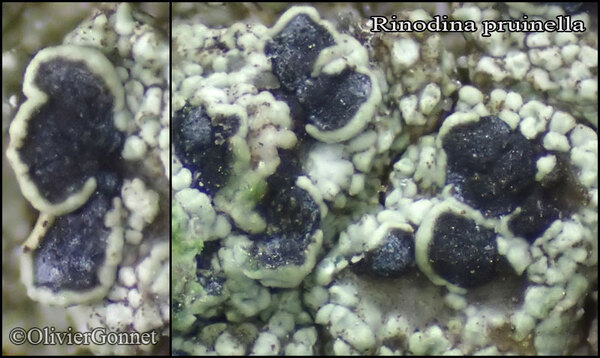
Courtesy Danièle et Olivier Gonnet - Source: https://www.afl-lichenologie.fr/Photos_AFL/Photos_AFL_R/Textes_R2/Rinodina_pruinella.htm
France, 28/3/2016 - Bonifacio, sentier côtier, alt. 70 m - Corse
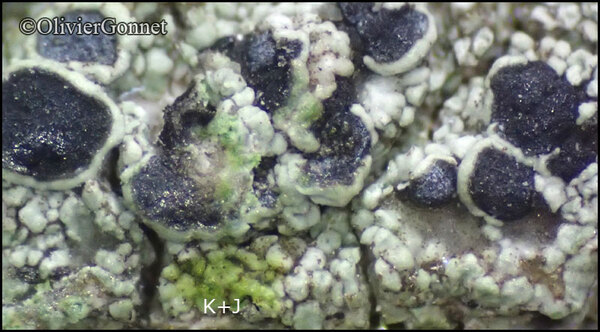
Courtesy Danièle et Olivier Gonnet - Source: https://www.afl-lichenologie.fr/Photos_AFL/Photos_AFL_R/Textes_R2/Rinodina_pruinella.htm
France, 28/3/2016 - Bonifacio, sentier côtier, alt. 70 m - Corse
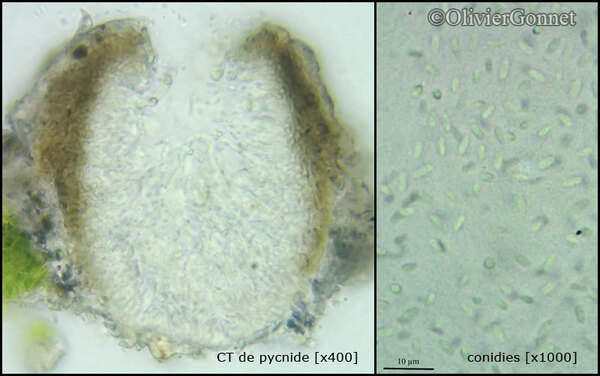
Courtesy Danièle et Olivier Gonnet - Source: https://www.afl-lichenologie.fr/Photos_AFL/Photos_AFL_R/Textes_R2/Rinodina_pruinella.htm
France, 28/3/2016 - Bonifacio, sentier côtier, alt. 70 m - Corse
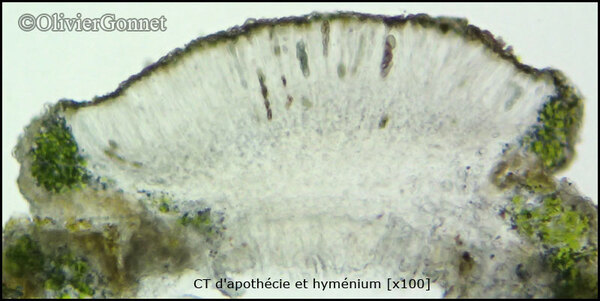
Courtesy Danièle et Olivier Gonnet - Source: https://www.afl-lichenologie.fr/Photos_AFL/Photos_AFL_R/Textes_R2/Rinodina_pruinella.htm
France, 28/3/2016 - Bonifacio, sentier côtier, alt. 70 m - Corse
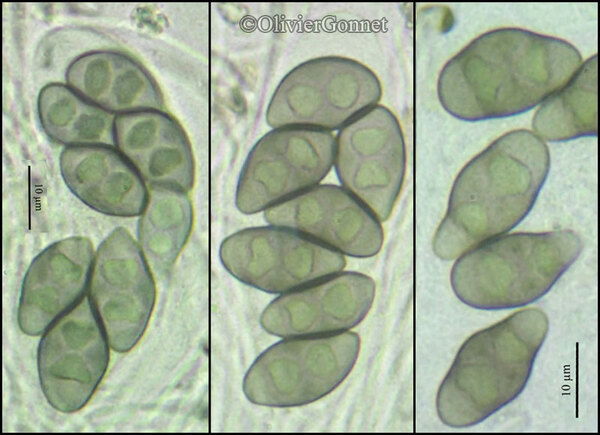
Courtesy Danièle et Olivier Gonnet - Source: https://www.afl-lichenologie.fr/Photos_AFL/Photos_AFL_R/Textes_R2/Rinodina_pruinella.htm
France, 28/3/2016 - Bonifacio, sentier côtier, alt. 70 m - Corse
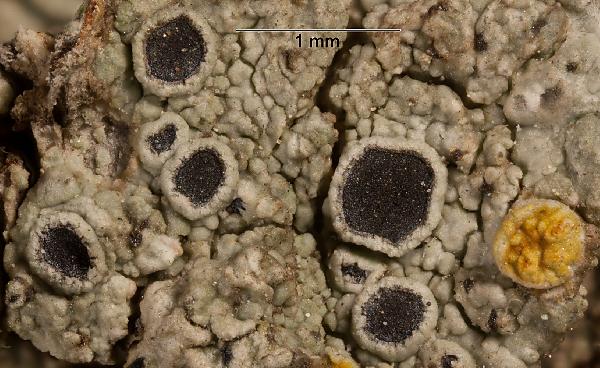
Ulrich Kirschbaum CC BY-SA 4.0 - Source: https://www.thm.de/lse/ulrich-kirschbaum/flechtenbilder
On twigs of Cupressus sempervirens.
SE-Europe; N-Cyprus; E of Girne; Beşparmak Mountains; SE of Kaplica; Kantara Castle
Growth form: Crustose
Substrata: bark
Photobiont: green algae other than Trentepohlia
Reproductive strategy: mainly sexual
Taxon bound to maritime-coastal situations
Commonnes-rarity: (info)
Alpine belt: absent
Subalpine belt: absent
Oromediterranean belt: absent
Montane belt: absent
Submediterranean belt: absent
Padanian area: absent
Humid submediterranean belt: absent
Humid mediterranean belt: rather rare
Dry mediterranean belt: rare

Predictive model
| Herbarium samples |


P.L. Nimis; Owner: Department of Life Sciences, University of Trieste
Herbarium: TSB (9973)
2001/12/11

Courtesy Danièle et Olivier Gonnet - Source: https://www.afl-lichenologie.fr/Photos_AFL/Photos_AFL_R/Textes_R2/Rinodina_pruinella.htm
France, 28/3/2016 - Bonifacio, sentier côtier, alt. 70 m - Corse

Courtesy Danièle et Olivier Gonnet - Source: https://www.afl-lichenologie.fr/Photos_AFL/Photos_AFL_R/Textes_R2/Rinodina_pruinella.htm
France, 28/3/2016 - Bonifacio, sentier côtier, alt. 70 m - Corse

Courtesy Danièle et Olivier Gonnet - Source: https://www.afl-lichenologie.fr/Photos_AFL/Photos_AFL_R/Textes_R2/Rinodina_pruinella.htm
France, 28/3/2016 - Bonifacio, sentier côtier, alt. 70 m - Corse

Courtesy Danièle et Olivier Gonnet - Source: https://www.afl-lichenologie.fr/Photos_AFL/Photos_AFL_R/Textes_R2/Rinodina_pruinella.htm
France, 28/3/2016 - Bonifacio, sentier côtier, alt. 70 m - Corse

Courtesy Danièle et Olivier Gonnet - Source: https://www.afl-lichenologie.fr/Photos_AFL/Photos_AFL_R/Textes_R2/Rinodina_pruinella.htm
France, 28/3/2016 - Bonifacio, sentier côtier, alt. 70 m - Corse

Courtesy Danièle et Olivier Gonnet - Source: https://www.afl-lichenologie.fr/Photos_AFL/Photos_AFL_R/Textes_R2/Rinodina_pruinella.htm
France, 28/3/2016 - Bonifacio, sentier côtier, alt. 70 m - Corse

 INDEX FUNGORUM
INDEX FUNGORUM
 GBIF
GBIF
